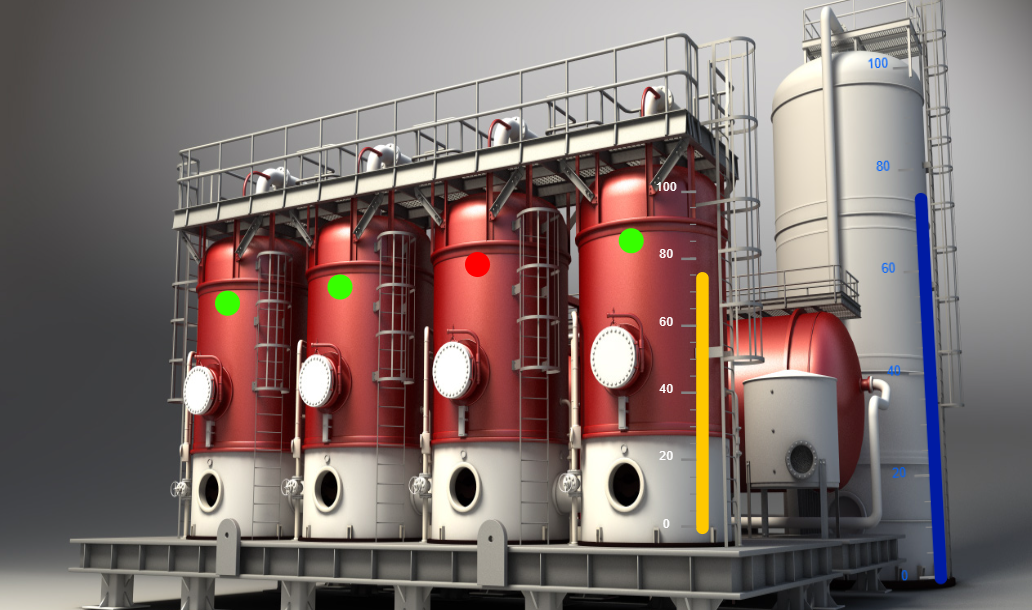What Is The Difference Between Alarm And Event In SCADA?
In the context of
Alarm Management systems, understanding the difference between alarms and events is crucial for proper system management and monitoring. These two terms are often used interchangeably, but they serve distinct purposes in the operation of SCADA systems. This article delves into the difference between an alarm and an event in SCADA, explains the various levels of SCADA alarms, and offers insights into alarm management strategies.

What is the Difference Between Alarm and Event in SCADA?
SCADA systems monitor industrial processes and provide real-time data to control and automate systems. Both alarms and events are critical components of this monitoring process. However, they are not the same.
Alarm: An alarm is a specific notification triggered when an abnormal condition occurs within the SCADA system. It typically requires immediate attention to prevent potential damage, safety hazards, or system failure. For example, a temperature exceeding a safe limit or a pressure drop below a critical threshold can trigger an alarm. The main function of an alarm is to alert operators to take corrective action immediately.
Event: An event, on the other hand, refers to a record of a change or action within the system that does not necessarily require immediate action but provides valuable data for monitoring and analysis. Events can be informational or related to system state changes, such as the startup of a pump or a change in the status of a valve. While events are important for maintaining system awareness, they do not always indicate a need for urgent intervention.
Difference Between Alarm and Warning
It’s essential to differentiate between alarms and warnings in SCADA systems. A warning typically indicates a condition that may lead to an alarm but does not require immediate intervention. For instance, a slight deviation from normal operating conditions might trigger a warning to notify operators of a potential problem, but it does not necessitate the same urgent response as an alarm. Warnings serve as a proactive measure, allowing operators to address issues before they escalate into alarms.
In contrast, alarms represent more immediate threats and require operators to take quick action. Alarms are usually more critical and can indicate that a process is in danger of failure if not addressed promptly.
SCADA Alarm Notification Software
SCADA alarm notification software is an integral tool for managing alarms and ensuring that the right personnel are informed of critical situations in real-time. This software facilitates the immediate dispatch of alerts through various communication channels, such as SMS, email, or automated phone calls. SCADA alarm notification systems enhance operational efficiency by ensuring that operators can quickly respond to alarms, minimizing downtime and preventing costly system failures.
Alarm notification systems can be configured to escalate alarms based on severity, ensuring that the most critical issues receive the highest level of attention. This system plays a vital role in maintaining both the safety and reliability of industrial operations.

What Are the Levels of SCADA Alarm?
SCADA alarms are typically categorized into different levels of severity, ranging from minor issues to critical faults that require immediate attention. Understanding the different levels of alarms helps operators prioritize their responses and allocate resources efficiently.
- Low-Level Alarms: These alarms are typically related to minor issues that may not cause significant disruptions but still require attention. For example, a low-level alarm could indicate a slight fluctuation in pressure that falls outside of normal operating parameters but isn’t a threat to the overall system.
- Medium-Level Alarms: These alarms represent conditions that could lead to more severe issues if not addressed in a timely manner. A medium-level alarm might indicate equipment degradation or a performance drop that could affect system efficiency.
- High-Level Alarms: High-level alarms are critical and indicate situations that could result in system failure or safety hazards if not corrected immediately. These alarms might be triggered by conditions such as overpressure, overheating, or failure of a key component.
What is an Alarm and Event?
An
alarm is a high-priority notification indicating that an abnormal or dangerous condition requires immediate attention. Alarms typically trigger a response from the operator or automated systems to correct the issue before it leads to failure or other safety concerns. An
event, however, is a less urgent log entry that marks the occurrence of a specific condition, such as a change in system status or equipment startup. Events are helpful for historical analysis, but they do not demand immediate intervention unless they point to an emerging problem.
What is an Alarm in SCADA?
An alarm in SCADA serves as a real-time notification system, ensuring that operators can respond to operational anomalies without delay. Alarm management for process control involves setting thresholds, monitoring system performance, and configuring the SCADA system to trigger alarms whenever certain conditions are met. Alarm management systems provide a crucial layer of safety by minimizing human error, ensuring that critical alarms are not missed, and enabling operators to take corrective actions efficiently.
To effectively manage alarms, SCADA systems often integrate advanced analytics, which can help distinguish between false alarms and legitimate threats, reducing alarm fatigue and enhancing operator effectiveness.

Is an Alarm Considered an Alert?
The terms alarm and alert are sometimes used interchangeably, but there are subtle differences. In SCADA systems, an alert is a general notification that signals the presence of a condition, often less urgent than an alarm. An alarm, however, is more severe and typically demands immediate attention.
The difference between alert and alarm lies in the level of urgency. While an alert may indicate a situation that needs to be monitored, an alarm often signifies a critical condition that could escalate if not addressed quickly. Both play important roles in maintaining system integrity, but alarms are typically reserved for more critical scenarios.
Alarm Notification System
An alarm notification system is vital in SCADA systems, ensuring that alarms are communicated promptly to the relevant personnel. These systems use various methods such as emails, SMS, and automated phone calls to alert operators and managers to critical events that require intervention. The effectiveness of alarm notification systems can significantly reduce downtime, increase safety, and enhance the overall operational efficiency of a SCADA system.
Conclusion
Understanding the difference between alarms and events in SCADA is key to effectively managing industrial processes. While alarms indicate urgent issues that require immediate action, events provide valuable data for monitoring and historical analysis. By setting up appropriate alarm levels and using alarm notification systems, SCADA operators can better prioritize their responses and ensure the smooth operation of complex systems.
Incorporating advanced alarm management strategies is essential for preventing system failures and ensuring the safety and reliability of industrial operations.
Interested in optimizing your SCADA system’s alarm management? contact us today!
You might also like



